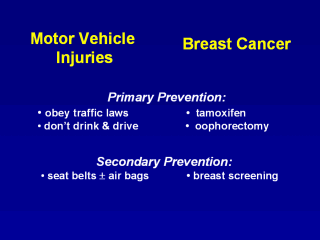| front |1 |2 |3 |4 |5 |6 |7 |8 |9 |10 |11 |12 |13 |14 |15 |16 |17 |18 |19 |20 |21 |22 |23 |24 |25 |26 |27 |28 |29 |30 |31 |32 |33 |34 |35|36 |37 |38 |39 |40 |41 |42 |review |
 |
Because the condition Iím talking about is:
motor vehicle injuries. We could all get rid of our cars, arrange our lives
so that we can walk to work, and use buses, trains and planes, which are
much safer than cars, to get everywhere else. But we donít. We drive and
assume the risks - because we value the freedom and independence that our
cars give us. Yet many well informed women at high risk for breast cancer, who decline prophylactic mastectomy because they value their breasts, are made to feel that their choice is irrational. It isnít fair. We all do our best to avoid car accidents. Similarly, many high risk women use measures such as tamoxifen and oophorectomy to reduce their risk of breast cancer. But should breast cancer nevertheless develop, they hope that just as wearing a seatbelt significantly reduces the risk of dying in a car accident, screening will lower their risk of dying of breast cancer. |